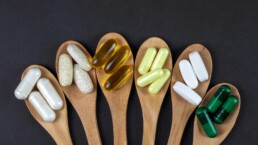Vitamin B12 is key for keeping you healthy. It helps make red blood cells and keeps your bones and brain in good shape. Let’s talk about why this vitamin matters so much for your health.
Table of Contents
ToggleVitamin B12 is super important for your body. It helps make your red blood cells, keeps your nerves working, and helps your DNA. But, lots of people, even in India, don’t get enough of it. This can cause health issues. Taking vitamin B12 supplements can fill this gap and keep your body running well.
What is Vitamin B12 and Why is it Important?
Vitamin B12 is very important for your body. It helps in making DNA and keeps your nerve cells healthy. Also, it helps in making the red blood cells.
Knowing about vitamin B12 helps make sure we get enough of it. This vitamin does a lot of good things for our body.
Essential Functions of Vitamin B12
Let’s talk about what vitamin B12 does in our body. It helps in some very important ways:
- It makes DNA. DNA is like a recipe book for our cells to grow and divide.
- It helps make our red blood cells healthy. These cells carry oxygen all over our body.
- It supports our nerves by keeping them well-protected. This is important for good nerve function.
Recommended Daily Intake
Most adults need about 2.4 micrograms of vitamin B12 each day. But, some groups need a bit more. For example, pregnant women should have 2.6 mcg daily.
Babies up to 6 months only need 0.4 mcg every day.
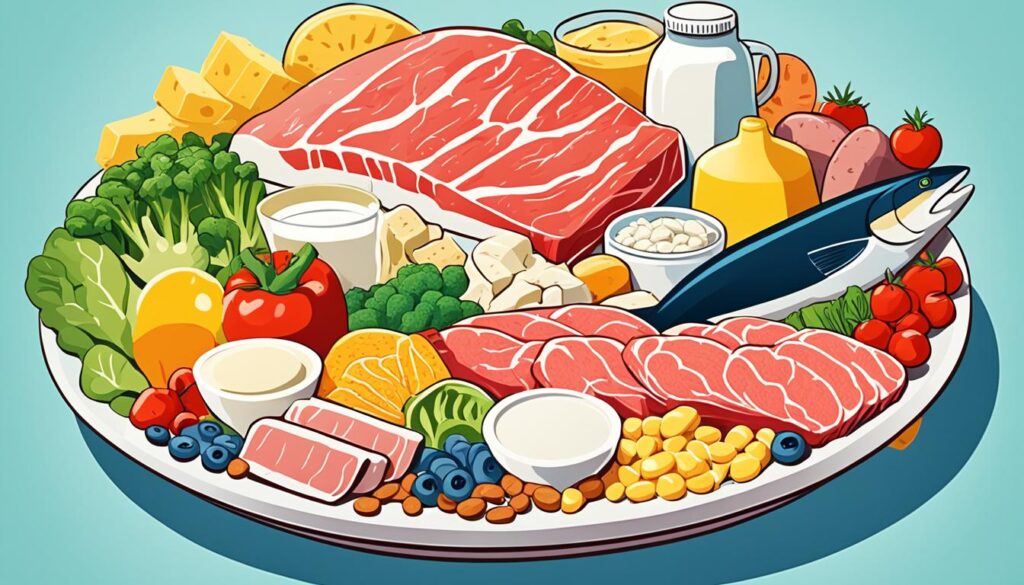
Your body can save up vitamin B12 for years in the liver. If there’s too much, the body lets it out through urine. But, people who don’t eat animal products might not get enough. They may need supplements to stay healthy.
Top Health Benefits of Vitamin B12 Supplements
Vitamin B12 supplements can boost your health in many ways. A big benefit of vitamin b12 supplements is making healthy red blood cells.
Supports Red Blood Cell Formation
Vitamin B12 helps create red blood cells that carry oxygen in your body. This makes sure you have enough oxygen. It boosts your energy and keeps you healthy.
May Prevent Birth Defects
For moms-to-be, having enough vitamin b12 and pregnancy is key. Studies show lacking vitamin B12 can raise the risk of birth defects. Taking B12 during pregnancy cuts this risk.

Using vitamin B12 daily brings many health perks. It helps with making red blood cells. And it cuts the chances of birth defects in babies.
Vitamin B12 and Bone Health
Keeping enough vitamin B12 in our bodies helps our bone health. It might lower the chance of getting osteoporosis. Studies show that not having enough vitamin B12 can make our bones less dense. This makes them more likely to break.
Some research points out that not having enough vitamin B12 seems to be linked to losing hip bone. It’s especially true for older women. Having enough folate and vitamin B12 seems to affect the risk of breaking a hip. If the vitamin B12 in your blood is low, your bones might be less strong.
How vitamin B12, homocysteine, and our bones are connected is pretty tricky. High homocysteine levels are usually because you’re lacking in folate, vitamin B6, or vitamin B12. This can make getting osteoporosis more likely. It’s because high homocysteine can stop some cells from keeping our bones healthy.
But, vitamin B6 is key for our bones, too. It helps an important enzyme, lysyl oxidase, do its job. When we don’t get enough vitamin B6, our bones might not be as strong. This is because it affects how collagen makes our bones tough.
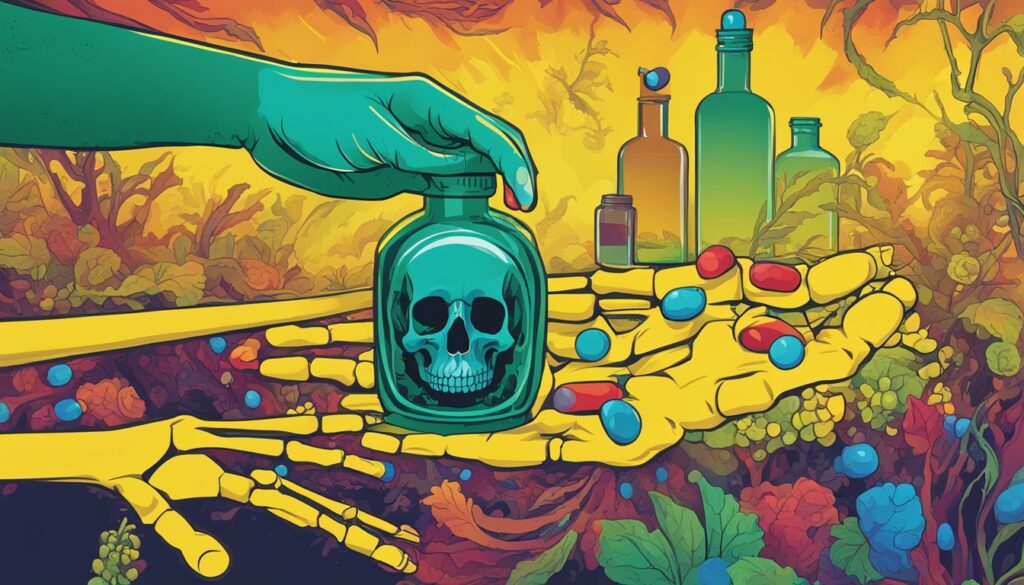
To keep our bone health up and avoid osteoporosis, we need to get enough vitamin B12. Eating a mix of foods is a good start. Things like meat, chicken, fish, eggs, and dairy are full of vitamin B12. But some people, like older adults, vegetarians, or those with health problems, might not get enough just from food. They might need to take vitamin B12 supplements.
Vitamin b12 supplements and Eye Health
Maintaining good vision is very important for our overall health. Research says vitamin B12 might help keep our eyes healthy. People who eat a lot of B vitamins, including B12, seem to have a lower risk of a common cause of vision loss in aged people.
May Reduce Macular Degeneration Risk
Age-related macular degeneration can make you lose your central vision over time. Scientists are not sure what exactly causes this. But, some think vitamin B12 could lower the chance of getting this eye problem. A review in 2015 found that people with AMD often had less B12 in their blood. Yet, we still need more proof to know for sure.
In 2014, the Journal of the American Medical Association Ophthalmology looked at vitamins B6, B12, and folate. They studied if eating more of these vitamins could lower the risk of certain eye issues. Their findings hinted that more B vitamins in your diet might lessen the risk of some eye diseases.
We must remember that while these studies are hopeful, we need bigger studies to be sure about B12 and eye health. For now, it’s not completely clear if B12 can really help prevent macular degeneration and other eye problems.
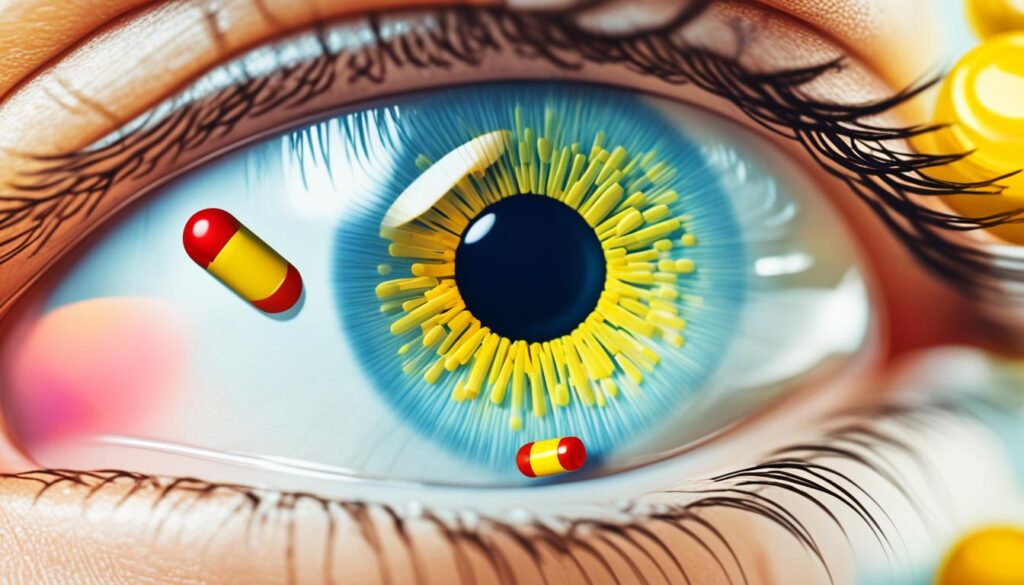
Eating foods high in vitamin B12 or taking supplements might help your eyes stay healthy. But, always talk to a doctor before making any big changes or taking new supplements. They can tell you what’s best for you.
Mood and Cognitive Benefits
Vitamin B12 is good for your mind, not just your body. It can boost your mental health and help you think better. Taking vitamin B12 can help fight off sadness and keep your memory sharp.
Potential Role in Depression Management
Not having enough vitamin B12 might make you feel down. People lacking in B12 seem to get sad more than those with enough. Taking extra B12 might lift your spirits if you’re feeling low, but this idea is still being studied.
Vitamin B12 helps make chemicals in your brain that make you feel good. It’s also important for fighting off swelling, which can make you sad. B12 isn’t a replacement for talking to someone or taking medicine for sadness, but it might add some extra cheer.
Cognitive Function and Memory
Vitamin B12 keeps your brain in good shape as you grow older. It helps keep you from forgetting things and may prevent conditions like dementia. Good B12 levels mean better memory and less slow thinking as you age.
It’s not clear how B12 does all this, but it has something to do with a healthy brain and nerves. B12 helps make red blood cells and keeps your brain working well. This can keep your mind sharp as you get older.
Eating foods with a lot of B12 or taking a supplement could help your mood, memory, and mind as you age. More study is needed, but it’s an easy step to take for better brain health.
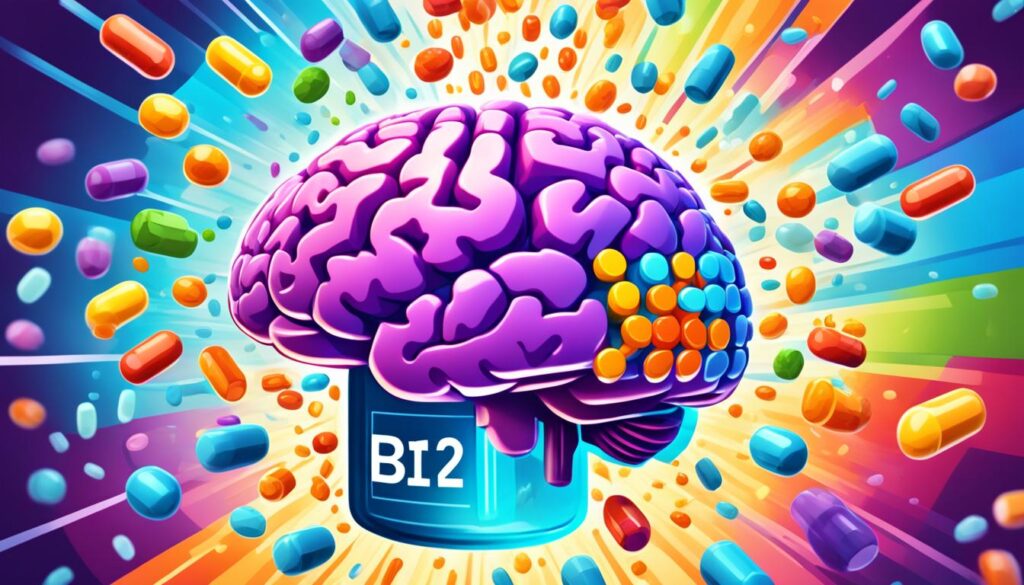
Vitamin B12 and Energy Levels
Vitamin B12 is known for lifting your energy, but the truth is more complex. It’s vital for making energy in our bodies. But, it doesn’t automatically give you a boost. If you lack vitamin B12, fixing that might ease tiredness and low energy.
The amount of B12 you need varies by age and gender. For example, newborns need 0.4 micrograms a day, whereas breastfeeding teens and women need 2.8 mcg. Sadly, more than 3% of adults over 50 don’t have enough B12. About 20% of older adults barely meet the B12 needs. This is because their bodies find it hard to absorb B12 as they get older.
Signs of not having enough B12 include feeling shaky, weak, tired, and moody. Getting the right amount can perk up your energy and mood. B12 is key for healthy nerves and making DNA and RNA, which are important for making energy.
B12 pills might not quickly boost your energy. But, they help your body make energy naturally. If you’re low on B12, taking pills or changing diet might really help your tiredness.

Yet, not everyone feels more energetic after taking B12 pills. Results change based on how low your B12 is, your health, and other issues. If you think B12 could help your energy, talk to a doctor. They can check and suggest what’s best for you.
Skin, Hair, and Nail Health
Vitamin B12 is important for your skin, hair, and nails. It keeps them looking good and healthy. If you don’t get enough B12, you might see dark spots on your skin, or your nails change color.
Supporting Healthy Hair, Skin, and Nails
Vitamin B12 helps with skin, hair, and nail health in big ways. It can even out dark spots on your skin. Also, it helps use iron from food, keeping your hair strong and preventing hair loss.
Vitamin B12 helps make red blood cells that take oxygen to hair and nails. This is good for making your hair grow and keeping your nails strong. Folic acid also helps your nails grow well.
Make sure to get enough B12 from food or supplements. This will make your skin, hair, and nails look great. You’ll feel more lively and self-assured.
Who is at Risk of Vitamin B12 Deficiency?
Vitamin B12 is very important for your body’s health and well-being. Some people are more at risk of becoming deficient in this vitamin. Knowing who these people are can help us keep our B12 levels good.
Older adults often have trouble absorbing enough B12 from food. At least 6% of those aged 60 and older are low in vitamin B12.
Also, people with gut problems like Crohn’s or celiac disease could have less B12. This is because their bodies might not absorb it well. The same goes for those who had operations on their stomachs.
- People who don’t eat any animal products might lack B12. This is because B12 is mostly in animal foods.
- Taking certain medicines, like for diabetes or acid reflux, can also lower B12 levels.
It’s key to spot and fix anything that might cause low B12. If you’re at high risk, make sure to check your B12 levels often. Then, work with your doctor to find the best way to get more B12. This could mean changes in your diet or taking supplements.
Symptoms of Vitamin B12 Deficiency
If you lack enough vitamin B12, you might feel tired and weak. Your skin could turn pale and your heart beats fast. You may not feel like eating, lose weight, or feel numb in your hands and feet. You might also become unsteady, sad, forgetful, or confused.
In babies, not having enough B12 can slow down their growth and learning. It is a problem for many older folks in the U.S. and U.K. This is because they can’t take B12 from food as well when they get older.
B12 lack can be wrongly thought of as something else because tests may not always show it. But, it is crucial to fix it to avoid serious health issues. Migraines, feeling down, and memory loss can be more likely if your B12 is low.
More signs of not having enough B12 are stomach problems like diarrhea and feeling sick. You might feel constipated, get bloated, or pass gas a lot. Plus, your tongue could get red, swollen, and hurt. You may also feel like tiny needles are poking you.
If you think you’re short on B12, see your doctor. They can do blood tests to know for sure. Then, they can give you pills or shots to get your B12 back up. This should help you feel better.
Potential Effects on Health Conditions
Vitamin B12 is key for good health. Researchers are looking into how it affects some health problems. Some studies show a possible link between too much B12 and cancer. But, they are not clear yet. More research is needed to know for sure.
Cardiovascular Health
Vitamin B12 might help your heart. It can lower homocysteine, which is not good for your heart. But, if B12 can directly cut the heart disease risk is not clear. Scientists are looking into how B12 affects heart health.
Cognitive Function and Dementia
There’s a lot of talk about vitamin B12 and how it impacts thinking and dementia. Some say B12 can slow down mental decline. But, we need more proof to be sure. Experts are on it to find out if B12 can help with how we think and lessen dementia’s risk.
Understanding B12’s role in health can be tricky. Even though it might help in some ways, we need more solid proof. This way, we can really know how B12 helps us stay healthy and happy.
Safety and Interactions
Vitamin B12, known as cyanocobalamin, is safe even at high doses. But it may not mix well with some meds and health issues. It’s key to know this to use B12 safely and well.
Most folks get plenty of B12 from their food. But some folks might not, like those with pernicious anemia. Or people with gut problems. Or those who don’t eat meat, dairy, or eggs. Very low B12 can mean trouble for your blood, guts, and even your nerves if you don’t get help.
The usual B12 in pills is cyanocobalamin. It’s usually okay but might not work well with some drugs. Like ones that lower stomach acid, diabetes medicine, and a few antibiotics. Always check with your doctor if you’re taking any drugs before taking B12 pills.
If you’re in the U.S. and have problems with B12 pills, let the FDA know at 1-800-FDA-1088. In Canada, call Health Canada at 1-866-234-2345 for the same. It’s smart to report any issues to help keep folks safe.
Vitamin B12 keeps your body running right. But too much can sometimes lower your potassium. Yet, this hardly happens. And it’s safe for moms to take the right amount when pregnant.
Not everyone needs B12 supplements. Make sure your body can really use them. If you’re not sure, talk to your doctor. They can help you decide what’s best for you.
Getting Vitamin B12 from Foods
Vitamin B12 is key for good health. You can boost it with supplements. But, finding it in food is great too. Eat lots of B12-rich food to stay healthy.
Meats and seafood are top for B12. They include:
- Meat, such as lamb liver and flat iron steak
- Seafood, including clams, sardines, tuna, and trout
- Dairy products, like low-fat milk, yogurt, and Swiss cheese
- Eggs
If you’re vegetarian or vegan, fortified foods are good. Try cereals and nutritional yeasts. They add B12 to your diet if you don’t eat animal products.
The best B12 sources, the data says, are:
- Lamb liver – 3,571% of Daily Value in 3.5 ounces.
- Clams – over 7,000% DV in 20 small clams (190 grams).
- Sardines – 554% DV in 1 cup (150 grams).
- Flat iron steak – 467% DV in one serving (about 190 grams).
- Fortified cereals – like Malt-O-Meal Raisin Bran, up to 62% DV per cup (59 grams).
Eating these foods will help you get enough B12. Get it from whole, natural foods.
Conclusion
Vitamin B12 is super important for your body. It helps with many things like making red blood cells. It’s also key for keeping your bones strong and your brain sharp. Taking B12 supplements could bring extra health perks.
But, always talk to your doctor first. They can check how much B12 your body has. Then, they’ll suggest how to fill any gaps or meet your wellness needs.
Focusing on B12 can lead to great health improvements. Adding it to your diet and taking supplements can work wonders. Remember, keeping a balanced diet and following your doctor’s advice is the way to go.
FAQ
What is vitamin B12 and why is it important?
Vitamin B12 is key for your health. It helps make DNA. It also keeps your nerve cells and red blood cells healthy.
What are the recommended daily intakes of vitamin B12?
Most adults need 2.4 micrograms daily. But, pregnant or nursing women need more.
How can vitamin B12 supplements support red blood cell formation?
B12 helps make your blood cells. These cells carry oxygen in your body. So, B12 is very important.
Can vitamin B12 help prevent birth defects?
Yes, B12 can reduce the risk of birth defects. It’s good to have enough B12 during pregnancy.
How does vitamin B12 support bone health?
B12 keeps your bones strong. It may lower the chance of getting osteoporosis. That’s a bone disease.
Can vitamin B12 supplements help with eye health?
Yes, B12 might lower the risk of eye problems in older adults. This includes vision loss.
How can vitamin B12 affect mental health and cognitive function?
Not getting enough B12 might make you feel sad. Taking B12 could make you feel better. It also helps memory.
Can vitamin B12 supplements boost energy levels?
B12 helps your body make energy. But, it won’t give you a quick energy boost. It’s more for long-term energy.
How can vitamin B12 affect the health of skin, hair, and nails?
B12 is good for your skin, hair, and nails. But, if you lack B12, you might notice skin, nail, and hair problems.
Who is at risk of developing a vitamin B12 deficiency?
Older adults and some vegetarians are at risk. So are those with certain health issues or who take specific medicines.
What are the symptoms of a vitamin B12 deficiency?
Not enough B12 can make you feel tired with weak muscles. You might also have skin or memory problems. Babies might not grow well.
Can vitamin B12 affect certain health conditions?
B12 might have mixed effects on cancer and heart disease risks. It might help your brain stay sharp, but we need more studies.
Are there any safety concerns or interactions with vitamin B12 supplements?
B12 is safe for most people, even in large amounts. But, it might interact with a few drugs. Talk to your doctor if you’re unsure.
How can I get vitamin B12 from my diet?
Meat, fish, eggs, and dairy have B12. Vegetarians can eat B12-fortified foods or take supplements.
Source Links

This article is medically reviewed by Dr. Chandril Chugh, Board-Certified Neurologist, providing expert insights and reliable health information.
Dr. Chandril Chugh is a U.S.-trained neurologist with over a decade of experience. Known for his compassionate care, he specializes in treating neurological conditions such as migraines, epilepsy, and Parkinson’s disease. Dr. Chugh is highly regarded for his patient-centered approach and dedication to providing personalized care.



